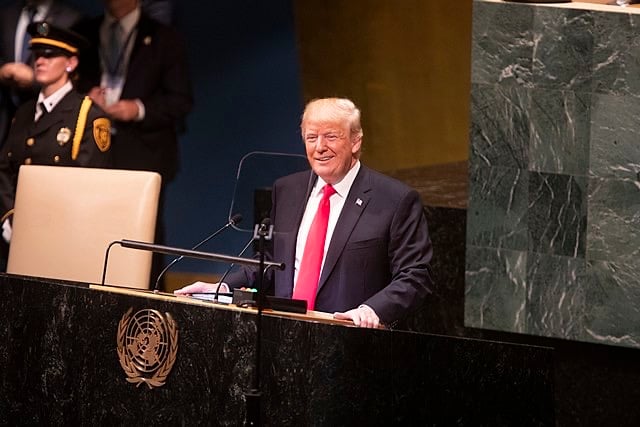President Donald Trump has issued a stark ultimatum to NATO allies during his UN General Assembly speech, threatening to impose “very strong” tariffs on Russia only if all member nations cease their “embarrassing” purchases of Russian oil and follow America’s lead in sanctioning Moscow.
Speaking in New York on Tuesday, Trump expressed frustration that he had only discovered two weeks ago that several NATO members continue to buy Russian energy whilst the alliance supports Ukraine’s defence against Russian aggression. “They can’t be doing what they’re doing. They’re buying oil and gas from Russia while they’re fighting Russia. It’s embarrassing to them,” the President declared.
Turkey stands as the most significant NATO purchaser of Russian oil, ranking as the third-largest buyer globally after China and India. According to the Centre for Research on Energy and Clean Air (CREA), Turkey spent approximately $62 billion on Russian oil between January 2023 and July 2025, whilst Hungary and Slovakia have spent around $13.4 billion and $10 billion respectively on Russian oil and gas.
Trump also turned his ire on China and India, accusing them of being “the primary funders of the ongoing war by continuing to purchase Russian oil.” China, the largest buyer, has spent approximately $158.7 billion on Russian oil over the same period, whilst India has emerged as the second-largest purchaser despite recent US pressure.
The President’s comments come after he already doubled tariffs on Indian goods to 50 per cent in response to New Delhi’s continued Russian oil purchases. Despite this pressure, India imported Russian oil worth approximately $53 billion last year, with Russian supplies accounting for 36 per cent of the Indian market before recent cutbacks.
Trump declared he was willing to implement a “very strong round of powerful tariffs” on Russia that he believed would “stop the bloodshed,” but crucially added a significant caveat: European countries must first stop buying Russian oil and adopt “the exact same measures” as the United States.
“I am ready to ‘go’ when you are. Just say when,” Trump said, acknowledging sarcastically that European leaders would be “thrilled” to hear his public chastisement, before adding, “but that’s the way it is.”
The President’s ultimatum exposes deep divisions within NATO over energy dependence on Russia. Whilst most European Union members have significantly reduced their Russian energy imports since the 2022 invasion of Ukraine, some nations remain heavily reliant on Moscow’s supplies.
Turkey’s position is particularly complicated, as it is not an EU member and therefore faces different pressures than Hungary or Slovakia, both of which have repeatedly cited their dependence on Russian oil via the Druzhba pipeline. Turkish President Recep Tayyip Erdoğan and Hungarian Prime Minister Viktor Orbán have maintained relatively warm relations with both Trump and Russian President Vladimir Putin.
Energy analysts point out that Turkey primarily purchases Russian oil because it is heavily discounted, and the country also benefits from refining Russian crude and selling fuel products back to Europe. This creates a complex web of economic interdependence that would be difficult to unravel quickly.
The EU has set a goal of eliminating Russian energy imports by 2027, but enforcement remains uneven. France, Belgium, and Spain accounted for approximately 85 per cent of all Russian liquid natural gas imports in 2024, according to the Institute for Energy Economics and Financial Analysis.
Trump’s stance creates a paradox: he demands NATO unity on sanctions whilst effectively giving individual members – including those with the closest ties to Russia – veto power over American action. “If NATO does as I say, the WAR will end quickly,” Trump wrote in a Truth Social post accompanying his speech. “If not, you are just wasting my time, and the time, energy, and money of the United States.”
The President also suggested that NATO countries should impose 50 to 100 per cent tariffs on China, to be withdrawn after the war ends, arguing that “China has a strong control, and even grip, over Russia, and these powerful Tariffs will break that grip.
Energy experts warn that completely eliminating Russian oil from global markets could have severe consequences. “Russia exports about 7.5 million barrels a day,” notes Amit Bhandari, an energy expert at the Mumbai-based think tank Gateway House. “There isn’t that much spare capacity in all of the world to frankly make that difference up.”
Bhandari warns that if Russian oil were to disappear from world markets, prices could spike to “$150-a-barrel oil” – more than double current costs, affecting “every single consumer in the world, including the U.S., China and Europe.”
Despite Trump’s tough rhetoric, enforcement of existing sanctions remains patchy. Over half of Russian seaborne oil exports in recent months have been transported on tankers flagged in G7+ nations, despite sanctions supposedly prohibiting such activities. The so-called “shadow fleet” of tankers with obscure ownership continues to facilitate Russian oil exports globally.
Trump’s comments also revealed his frustration with the Ukraine conflict’s trajectory, having previously claimed he would swiftly bring it to an end upon returning to office. He suggested the war would have been “easier to resolve because of my relationship with President Putin, which had always been a good one.”
The President’s ultimatum to NATO comes at a particularly tense moment, following recent Russian drone incursions into Polish airspace and other NATO territory. Whilst Poland and other frontline states have called for stronger action against Russia, Trump appeared to downplay these incidents, suggesting they “could have been a mistake.”
As Trump continues his meetings at the UN General Assembly, his conditional approach to Russian sanctions highlights the complex balancing act facing NATO. The alliance must navigate between maintaining unity, managing energy security concerns, and effectively pressuring Russia to end its war in Ukraine.
The irony is not lost on observers that Trump’s approach essentially allows the NATO members most sympathetic to Russia – and most dependent on its energy – to block collective Western action against Moscow, potentially undermining the very pressure campaign he claims would end the war.
Follow for more updates on Britannia Daily



